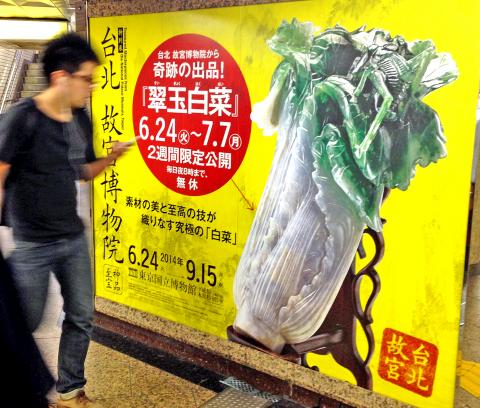Taiwan yesterday threatened to cancel a planned exhibition of the National Palace Museum’s collections in Japan over posters said to undermine the nation’s dignity by omitting the word “national.”
The Ministry of Foreign Affairs said yesterday it has lodged a serious protest with Tokyo over the matter.
The Japanese organizers involved with the exhibition must correct “Palace Museum” to “National Palace Museum” by 11pm, Taiwan time (midnight in Tokyo) today, or Taiwan will cancel the event, the ministry said in a statement.

Photo: CNA
“We earnestly hope Japan will respect our national position and handle the matter with caution so as to continue to move bilateral relations and people-to-people exchanges forward,” it said.
If the exhibition is canceled over the posters, first lady Chow Mei-ching (周美青) will call off her planned visit to Japan for the exhibition’s opening, Presidential Office spokesman Ma Wei-kuo (馬瑋國) said.
An afternoon press conference yesterday in Tokyo held to officially announce the exhibition, which is due to open on Tuesday, was put off as the ministry worked with Japanese officials in an effort to resolve the issue.
Selected artifacts from the museum are set to be put on display under the title “Treasured Masterpieces from the National Palace Museum, Taipei” at the Tokyo Museum from Tuesday to Sept. 15, and at the Kyushu National Museum from Oct. 7 to Nov. 30.
Controversy erupted when some posters advertising the Tokyo exhibition were found to refer to the National Palace Museum as simply “Palace Museum, Taipei,” an apparent violation of an agreement between Taiwan and Japan that the Taipei museum’s full name be used in all publicity materials.
The posters in question, which have been spotted at train stations and parks in Tokyo, were prepared by a media sponsor group comprising major media outlets including NHK, the Asahi Shimbun and other TV stations and newspapers.
Meanwhile, official posters and brochures prepared by the Tokyo National Museum refer to the Taipei museum by its official name.
President Ma Ying-jeou (馬英九) said that “National Palace Museum” is the museum’s only official name and that the government will not accept any names that undermine the nation’s dignity.
Japan, like most other countries, has diplomatic ties with Beijing rather than Taipei, but maintains close trade and civil ties with the nation, which was its colony from 1895 to 1945.
The National Palace Museum announced last year a loan of 231 artifacts to Japan, its first to an Asian country, following exhibitions in the US, France, Germany and Austria.
The museum boasts more than 600,000 artifacts spanning 7,000 years of Chinese history from the Neolithic period to the end of the Qing Dynasty, which were mostly removed from Beijing’s Forbidden City.
For years the National Palace Museum was unwilling to lend the artifacts to Japan for fear that China would try to reclaim them, until the Japanese government passed a law in 2011 to prevent such seizures.
Additional reporting by AFP

TRAGEDY STRIKES TAIPEI: The suspect died after falling off a building after he threw smoke grenades into Taipei Main Station and went on a killing spree in Zhongshan A 27-year-old suspect allegedly threw smoke grenades in Taipei Main Station and then proceeded to Zhongshan MRT Station in a random killing spree that resulted in the death of the suspect and two other civilians, and seven injured, including one in critical condition, as of press time last night. The suspect, identified as a man surnamed Chang Wen (張文), allegedly began the attack at Taipei Main Station, the Taipei Fire Department said, adding that it received a report at 5:24pm that smoke grenades had been thrown in the station. One man in his 50s was rushed to hospital after a cardiac arrest

A car bomb killed a senior Russian general in southern Moscow yesterday morning, the latest high-profile army figure to be blown up in a blast that came just hours after Russian and Ukrainian delegates held separate talks in Miami on a plan to end the war. Kyiv has not commented on the incident, but Russian investigators said they were probing whether the blast was “linked” to “Ukrainian special forces.” The attack was similar to other assassinations of generals and pro-war figures that have either been claimed, or are widely believed to have been orchestrated, by Ukraine. Russian Lieutenant General Fanil Sarvarov, 56, head

SAFETY FIRST: Double the number of police were deployed at the Taipei Marathon, while other cities released plans to bolster public event safety Authorities across Taiwan have stepped up security measures ahead of Christmas and New Year events, following a knife and smoke bomb attack in Taipei on Friday that left four people dead and 11 injured. In a bid to prevent potential copycat incidents, police deployments have been expanded for large gatherings, transport hubs, and other crowded public spaces, according to official statements from police and city authorities. Taipei Mayor Chiang Wan-an (蔣萬安) said the city has “comprehensively raised security readiness” in crowded areas, increased police deployments with armed officers, and intensified patrols during weekends and nighttime hours. For large-scale events, security checkpoints and explosives

PUBLIC SAFETY: The premier said that security would be tightened in transport hubs, while President Lai commended the public for their bravery The government is to deploy more police, including rapid response units, in crowded public areas to ensure a swift response to any threats, President William Lai (賴清德) said yesterday after a knife attack killed three people and injured 11 in Taipei the previous day. Lai made the remarks following a briefing by the National Police Agency on the progress of the investigation, saying that the attack underscored the importance of cooperation in public security between the central and local governments. The attack unfolded in the early evening on Friday around Taipei Main Station’s M7 exit and later near the Taipei MRT’s Zhongshan